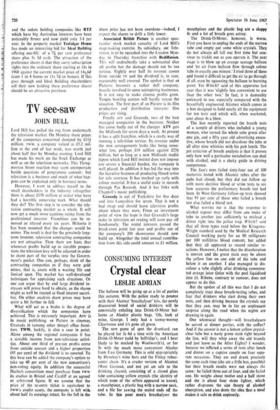TV see-saw
JOHN BULL
Lord Hill has pulled the rug from underneath the television market. On Monday share prices of the companies concerned slumped by £111 million; -rww, a company valued at £5.2 mil- lion at the end of last week, was worth just about half that by Monday evening. Lord Hill has made his mark on the Stock Exchange as well as on the television networks. This Throg- morton Street reaction may seem unimportant beside questions of programme content: but television is a business and much of what hap- pens can be explained only in business terms.
However, I want to address myself to the small shareholders in the industry (altogether there is about £150 million at stake) who have had a horribly unnerving week What should they do? The first step is to consider the tele- vision contracting market as a whole. It will now get a much more cautious rating from the professional investor. Franchises can be re- moved or altered every six years. Hitherto it has been assumed that the changes would be minor. The result is that for the genuinely long- term investor, television contracting companies are not attractive. Then there are fears that whenever profits build up to sizeable propor- tions the television levy will be adjusted in order to shunt part of the surplus into the Govern- ment's pocket. One can, perhaps, think of the contracting companies as if they were gold mines, that is, assets with a wasting life and limited span. The market has well-developed techniques for appraising such situations. Or one can argue that by and large dividend in- creases will prove hard to obtain, so the shares might as well be treated as fixed interest securi- ties. On either analysis share prices may have quite a bit farther to fall.
What will act as a brake is the degree of diversification which the companies have achieved. This is extremely important. An' is in music publishing. AB Picture in cinemas, Granada in (among other things) office furni- ture. TWW, luckily, is also a case in point. Alone among the regional companies it has a sizeable income from non-television activi- ties. About one third of pre-tax profits come from outside sources and a higher proportion (45 per cent) of the dividend is so covered. To this base can be added the company's option to take up 40 per cent of the new consortium's non-voting equity. In addition the successful Harlech consortium must purchase from irsvw its studios in Bristol and Cardiff at an agreed or arbitrated figure. If we assume• that the price of the re-entry ticket is equivalent to TWW's studio assets, the company is left with-- about half its earnings intact So the fall in the
share price has not been overdone—indeed, I expect the shares to drift a little lower.
Associated British Picture is another spec- tacular stock market casualty of Lord Hill's map-making exercise. Its subsidiary, ABC Tele- vision, is to be squashed into the London Mon- day to Thursday franchise with Rediffusion. This will undoubtedly take a substantial slice oft profits but the damage should not be too serious. Slightly over half its revenue comes from outside TV and the dividend is, in case, reasonably well covered. The upshot is that AB Pictures becomes a rather dull company, heavily involved in some uninspiring businesses. It is not easy to make cinema profits grow. Tenpin bowling centres will hardly rescue the situation. The best part of AB Picture is its film production and distribution interests: film prices are rising.
Finally ATV and Granada. two of the best managed companies in the business. Neither has come badly out of the changes. ATV gets the Midlands for seven days a week. At present it has a split franchise, which is a costly way of running a television service. Its revenue under the new arrangements looks like being some- what less, perhaps £19 million against f23+ million, but as long as a new Midlands studio (upon which Lord Hill insists) does not impose too severe a financial burden, the company is well placed. In addition it has led the way into the lucrative business of producing filmed series for sale overseas. It has stocked up early with colour material. It has a useful stake in records through Pye Records. And it has links with Chappell's music publishing.
Granada is out of Yorkshire for five days and into Lancashire for seven. That is not a bad swap and should leave television profits about where they were. From an investment point of view the hope is that Granada's large stake in television set renting will soon pay off handsomely. The rental interests passed the break-even point last year and profits out of the company's 209 showrooms should now build up. Altogether the total annual contribu- tion from this side could amount to fl million.


































 Previous page
Previous page